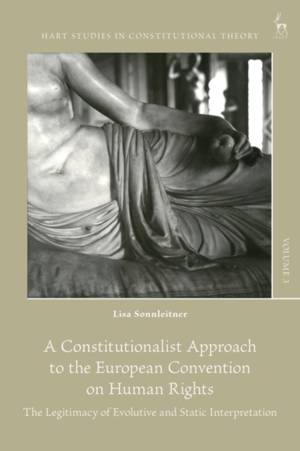
- Retrait gratuit dans votre magasin Club
- 7.000.000 titres dans notre catalogue
- Payer en toute sécurité
- Toujours un magasin près de chez vous
- Retrait gratuit dans votre magasin Club
- 7.000.0000 titres dans notre catalogue
- Payer en toute sécurité
- Toujours un magasin près de chez vous
A Constitutionalist Approach to the European Convention on Human Rights
The Legitimacy of Evolutive and Static Interpretation
Lisa Sonnleitner
203,95 €
+ 407 points
Format
Description
This book presents a new constitutional argument for the legitimacy of evolutive interpretation of the ECHR. It constructs a model, in which evolutive and static constitutional principles are balanced with each other.
The author argues that there are three possible interpretive approaches in time-sensitive interpretations of the ECHR, but that only one of them is justifiable by reference to the constitutional principles of the ECHR in every single case. The ECHR's constitutional principles either require an evolutive or static interpretation or they do not establish a preference relation at all, which leads to a margin of appreciation of the member states in the interpretation of the Convention. The balancing model requires the determination of the weights of the competing evolutive and static constitutional principles. For this purpose, the author defines weighting factors for determining the importance of evolutive or static interpretation in a concrete case.Spécifications
Parties prenantes
- Auteur(s) :
- Editeur:
Contenu
- Nombre de pages :
- 224
- Langue:
- Anglais
- Collection :
Caractéristiques
- EAN:
- 9781509946877
- Date de parution :
- 21-04-22
- Format:
- Livre relié
- Format numérique:
- Genaaid
- Dimensions :
- 156 mm x 234 mm
- Poids :
- 489 g

Les avis
Nous publions uniquement les avis qui respectent les conditions requises. Consultez nos conditions pour les avis.






